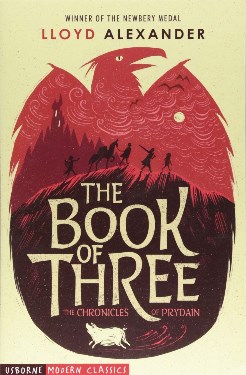Taran wanted to make a sword; but Coll, charged with the practical side of his education, decided on horseshoes. And so it had been horseshoes all morning long. Taran’s arms ached, soot blackened his face. At last he dropped the hammer and turned to Coll, who was watching him critically.
“Why?” Taran cried. “Why must it be for horseshoes? As if we had any horses!”
Coll was stout and round and his great bald head glowed bright pink. “Lucky for the horses,” was all he said, glancing at Taran’s handiwork.
“I could do better at making a sword,” Taran protested. “I know I could.” And before Coll could answer, he snatched the tongs, flung a strip of red-hot iron to the anvil, and began hammering away as fast as he could.
“Wait, wait!” cried Coll. “That is not the way to go after it!”
Heedless of Coll, unable even to hear him above the din, Taran pounded harder than ever. Sparks sprayed the air. But the more he pounded, the more the metal twisted and buckled, until, finally, the iron sprang from the tongs and fell to the ground. Taran stared in dismay. With the tongs, he picked up the bent iron and examined it.
“Not quite the blade for a hero,” Coll remarked.
“It’s ruined,” Taran glumly agreed. “It looks like a sick snake,” he added ruefully.
“As I tried telling you,” said Coll, “you had it all wrong. You must hold the tongs—so. When you strike, the strength must flow from your shoulder and your wrist be loose. You can hear it when you do it right. There is a kind of music in it. Besides,” he added, “this is not the metal for weapons.”
Coll returned the crooked, half-formed blade to the furnace, where it lost its shape entirely.
“I wish I might have my own sword,” Taran sighed, “and you would teach me sword-fighting.”
“Wisht!” cried Coll. “Why should you want to know that? We have no battles at Caer Dallben.”
“We have no horses, either,” objected Taran, “but we’re making horseshoes.”
“Get on with you,” said Coll, unmoved. “That is for practice.”
“And so would this be,” Taran urged. “Come, teach me the sword-fighting. You must know the art.”
Coll’s shining head flowed even brighter. A trace of a smile appeared on his face, as though he were savouring something pleasant. “True,” he said quietly, “I have held a sword once or twice in my day.”
“Teach me now,” pleaded Taran. He seized a poker and brandished it, slashing at the air and dancing back and forth over the hard-packed earthen floor. “See,” he called, “I know most of it already.”
“Hold your hand,” chuckled Coll. “If you were to come against me like that, with all your posing and bouncing, I should have you chopped into bits by this time.” He hesitated a moment. “Look you,” he said quickly, “at least you should know there is a right way and a wrong way to go about it.”
He picked up another poker. “Here now,” he ordered, with a sooty wink, “stand like a man.”
Taran brought up his poker. While Coll shouted instructions, they set to parrying and thrusting, with much banging, clanking and commotion. For a moment Taran was sure he had the better of Coll, but the old man spun away with amazing lightness of foot. Now it was Taran who strove desperately to ward of Coll’s blows.
Abruptly, Coll stopped. So did Taran, his poker poised in mid-air. In the doorway of the forge stood the tall, bent figure of Dallben.
